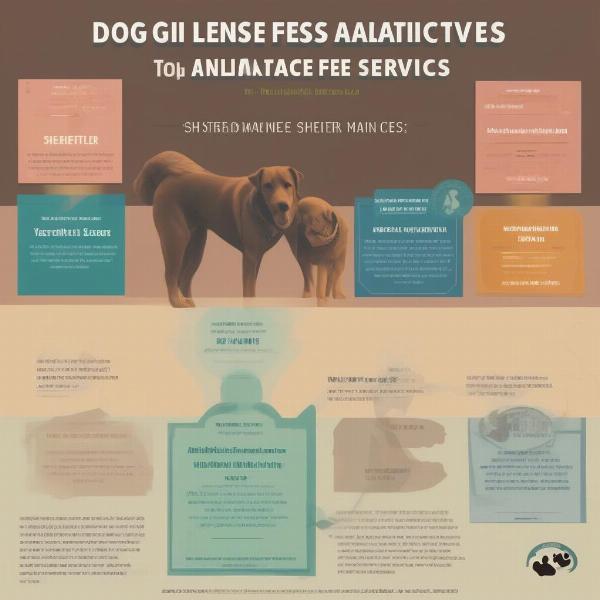A dog license tag, a small metal charm dangling from your furry friend’s collar, is more than just an accessory. It’s a vital piece of identification, a symbol of responsible pet ownership, and in many places, a legal requirement. This article will explore the importance of dog license tags, how to obtain one, and the benefits they provide for both you and your canine companion.
Why License Your Dog?
Licensing your dog is often mandated by law. This helps local authorities keep track of the dog population, enforce rabies vaccination requirements, and manage animal control efforts. It also provides a crucial link back to you should your dog ever get lost. Imagine the relief of knowing that a simple scan of the tag can reunite you with your beloved pet.
Peace of Mind: Quick Reunification
A license tag acts as your dog’s immediate ID. If your dog slips its leash or escapes from the yard, the tag provides crucial contact information. Anyone who finds your dog can quickly contact you or the licensing agency to facilitate a swift reunion, saving you worry and your dog from potential dangers.
Proof of Ownership: Preventing Disputes
A dog license can serve as proof of ownership in cases of disputes or if your dog is accidentally picked up by animal control. This can be invaluable in situations where ownership might be questioned, ensuring your furry family member comes home to you.
Supporting Animal Services: Contributing to Community Welfare
The fees collected from dog licenses often directly fund vital animal control services, including shelters, adoption programs, and community outreach initiatives. By licensing your dog, you’re contributing to the well-being of other animals in your community.  A graphic showing how dog license fees contribute to animal shelters
A graphic showing how dog license fees contribute to animal shelters
How to Get a Dog License Tag
Obtaining a dog license tag is typically a simple process. The requirements and procedures vary depending on your location, so it’s essential to check with your local animal control agency or municipal office. You’ll likely need to provide proof of your dog’s rabies vaccination and pay a small fee. Some jurisdictions may offer discounted rates for senior citizens or sterilized dogs. Check out our article on montgomery county maryland dog license for a specific example.
What Information is on a Dog License Tag?
Dog license tags typically include a unique registration number, the licensing jurisdiction (city or county), and often a contact number for the local animal control agency. Some tags may also include your dog’s name or your phone number, although this varies depending on local regulations.
Beyond the Basics: Ensuring Your Dog’s Safety
While a license tag is crucial, it’s only one part of a comprehensive safety plan for your dog. Microchipping offers permanent identification, and a secure collar with an ID tag containing your current contact information is essential. Regularly updating your dog’s information with the licensing agency ensures that your contact details remain current. Taking your dog to colonial dog park is much safer with proper identification.
Conclusion: License Your Dog, Secure Their Future
Licensing your dog is a small act with significant implications. It’s a legal obligation in many places, a vital tool for reuniting lost pets, and a way to support animal welfare in your community. Get your dog licensed today and provide them with the security they deserve.
FAQ:
- Do I need to license my dog if it stays indoors all the time? Yes, in most jurisdictions, all dogs are required to be licensed, regardless of whether they are indoor or outdoor dogs.
- What if my dog loses its license tag? Contact your local animal control agency to report the lost tag and obtain a replacement.
- How often do I need to renew my dog’s license? Renewal periods vary, typically annually or every few years. Check with your local licensing agency.
- What if I move to a new location? You will need to obtain a new license in your new jurisdiction.
- Are there exemptions for service dogs? Service dog licensing requirements vary depending on the location. Contact your local agency for specific information.
- What happens if I don’t license my dog? You may be subject to fines or penalties.
- Can I license my dog online? Many jurisdictions offer online licensing options. Check with your local agency.
ILM Dog is a leading international online resource for dog owners, offering expert advice and information on all aspects of dog care and wellbeing. From breed selection and health to training, nutrition, and grooming, ILM Dog is your go-to source for trustworthy, practical guidance. We provide specialized knowledge on various breeds, health conditions, and training techniques to ensure your dog thrives. For any inquiries, contact us at [email protected] or call +44 20-3965-8624. Visit ILM Dog for more information and resources to help you provide the best care for your canine companion.